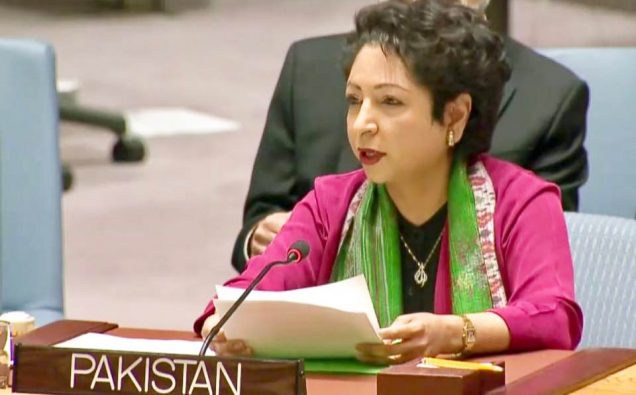
The Security Council’s meeting Friday over deteriorating situation in Jammu and Kashmir reaffirmed validity of UNSC resolutions, and now in contradiction of Indian claims the dispute is gaining much wider international spotlight, Pakistan’s ambassador to the United Nations said.
“This meeting has reaffirmed the validity of the UNSC resolutions on the occupied state of Jammu and Kashmir,” Ambassador to the United Nations Maleeha Lodhi said after the apex body concluded its meeting – the first UNSC meeting in more than 50 years.
Convened in response to Pakistan’s and China’s requests, the meeting held consultations on the longstanding issue between the nuclear-armed South Asian neighbors in the wake of Indian BJP Government’s move to annex the disputed territory.
“The voice of the Kashmiri people, the voice of the people of occupied Kashmir has been heard today in the highest diplomatic forum of the world.
“They are not alone, their voices have been heard, their plight, their hardship, their pain, their suffering, their occupation and the consequences of that occupation has been heard in the UNSC,” Lodhi said.
The Pakistani diplomat said that there was “an effort to stop this meeting from convening” but expressed gratitude to China and all 15 members for agreeing to hold the meeting.
She argued that New Delhi’s claim that Kashmir was an “internal matter” had been defeated as the UNSC held deliberations on the burning issue.
Meanwhile, China’s ambassador to the United Nations, Zhang Jun, said members of the Security Council believe that parties to the Jammu and Kashmir dispute should refrain from unilateral action that may worsen the situation.
Zhang, who spoke to reporters at the end of the UNSC meeting, described the situation in Kashmir is “already very tense and very dangerous.”
Beijing was a proponent of the UN Security Council meeting, initially sought by Pakistan.
“The Security Council has just held an informal consultation and listened very carefully to the briefings and reports from the secretariat including the briefing from the military observer group on the ground that helped us understand the situation better. The Secretary General also issued a statement a few days ago,” said Zhang, according to Reuters.
“Members have expressed that there are serious concerns concerning the situation in Jammu and Kashmir. They are also concerned about the human rights situation there and it is the general view of the members that parties concerned should refrain from taking any unilateral action which might further aggravate tensions.”
“China holds the view that the issue of Jammu Kashmir is an issue left from history between India and Pakistan. According to UNSC resolutions, the status of Kashmir is undecided and it is an internationally recognized dispute. The Kashmir issue should be resolved properly through peaceful means in accordance with the UN charter, the relevant SC resolutions and bilateral agreements. This represents the international community’s consensus,” China’s ambassador to the UN added.
Indian Ambassador to the UN Akbaruddin on the other hand said developments with regard to Article 370 of the Indian Constitution were an internal Indian matter.
New Delhi, he said, was ready to talk to Pakistan for peace provided there was an end to terrorism.
The meeting took place Kashmiris faced a strict clampdown, nearly two weeks after India sent in more forces, imposed a curfew as it announced a change in the constitutional status of the disputed Kashmir region, making it part of India without holding any consultations with Kashmiri leaders.






![By w:user:Planemad [CC BY-SA 3.0 (http://creativecommons.org/licenses/by-sa/3.0)], via Wikimedia Commons](https://www.viewsnews.net/wp-content/uploads/2016/11/New-Kashmir-regional-map.png)












